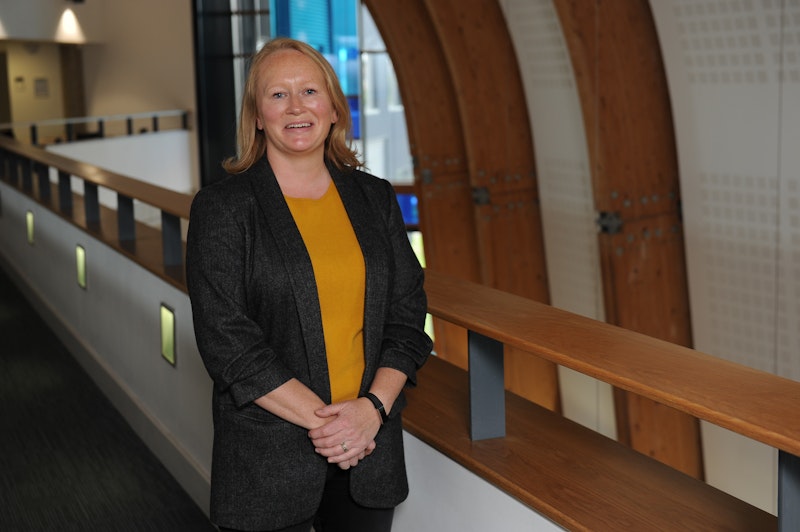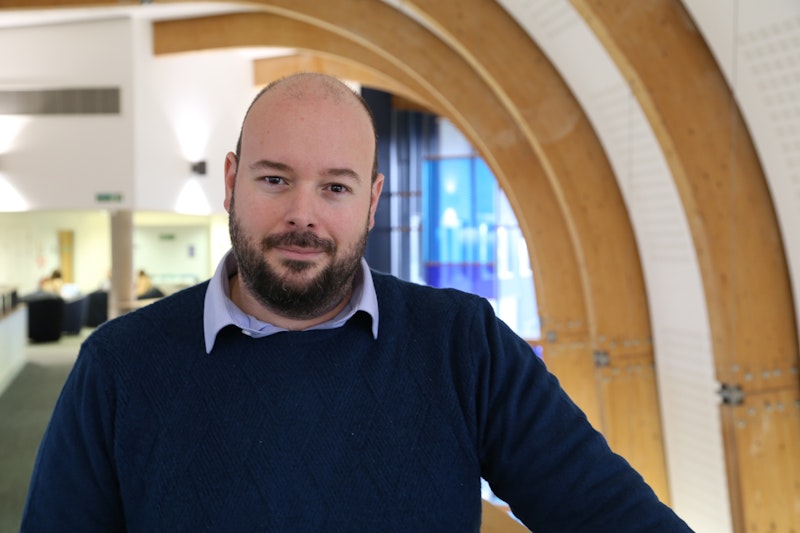

Informatics and Operations PhD Opportunities
This postgraduate research programme offers PhD or MPhil supervision in many areas of information management.
At a glance
- Choose from a range of research domains available in Informatics and Operations
- 3 PhD entry points each year (September, January and April)
- Participate in regular research seminars
- Work with faculty and researchers from Digitalisation, Marketing and Entrepreneurship
- Programme features research relevant and personal development modules and workshops
- Subject area(s)
- Digitalisation, Operations
- Duration
- Three - four years (FT), four - six years (PT)
- Attendance
- Full-time , Part-time
- Programme Director
-
 Dr Rodrigo Perez-Vega
Dr Rodrigo Perez-Vega
Overview
We offer PhD opportunities in a range of themes surrounding business informatics. This includes theoretical and applied research in domains such as applied informatics and semiotics; service operations management, strategic analysis; systems science, business informatics; social informatics; health informatics; system science and perceptual and usability informatics.
The University has a formal code of practice for research students. This ensures that adequate supervision and appropriate research skills training are provided.
You may pursue this PhD programme full-time or part-time at Henley Business School. Although study on campus is encouraged, it may be carried out away from campus, for example at an institution where research facilities are available. Support for remote learning is considered on a case-by-case basis.
A PhD is usually taken on a full-time basis over three to four years. In some research areas, a part-time option taking four-six years is also available.
The full-time PhD Programme starts in September at the beginning of the academic year (in some departments January and May entries are also possible). If necessary for your training, you may be required to come to the University earlier to attend some preparatory courses. The PhD contains research relevant and personal development modules.
Year One: During the first year of your studies, subject to study mode and the discretion of the Postgraduate Research Director, you will be required to:
- Attend at least 60 credits from PhD/Masters level courses in Research Methods and other relevant courses, plus a non-credit bearing course (see below)
- Attend some short courses (2-3 hours each) provided by the Reading Researcher Development Programme at the Doctoral and Researcher College (overseeing PhD studies within the University of Reading)
- You may be required to attend the Preparing to Teach training programme (which is necessary to be able to complete any teaching-related activities within Henley Business School)
- Participate in regular research seminars organised by your Department and others relevant to your area of interest
- Hold regular meetings with your supervisor(s).
Year Two and Three: The PhD researcher should be will be devoted to the collection and analysis of data, and the completion of your thesis/papers in advance of the viva examination. Subject to study mode and PGR director discretion, you will be required to:
- Attend some short courses (2-3 hours each) provided by the Reading Researcher Development Programme at the Doctoral and Researcher College (overseeing PhD studies within the University of Reading)
- Participate in regular research seminars organised by your Department and others relevant to your area of interest
- Hold regular meetings with your supervisor(s).
Annual Presentations: each year you will be required to attend all relevant PhD annual presentations and, at least once per year, will be required to present and answer questions to other researchers concerning your research contribution. Feedback will be provided by independent assessors to help the researcher in highlighting and addressing possible concerns in the research plan.
Confirmation of Registration: In the middle of your second year, all PhD researchers are required to present and defend the research completed to date – via written update and/or interactive oral discussion with two independent assessors. The researcher should be able to demonstrate: clarity in the problem definition question/scope (aim/objectives); appropriate critical consideration of, and use, of methodologies and methods; rationalised access to relevant data required to complete the PhD; awareness and knowledge of data analysis required to address the defined research question; and a plan to complete the PhD within the given registration duration. For researchers submitting a PhD by research papers, at least one paper (presenting new knowledge) should be available for review by the assessors. If the researcher intends to submit a research thesis, the researcher should be willing to provide a draft of chapters 1-4 upon request. Failure, within the confirmation of registration meeting, to successfully evidence their ability to complete the PhD within the given registration duration, may result in termination of the PhD. An award of an MSc by Research is possible at this point, yet dependent on successful completion of pertinent taught components and submission of a research dissertation.
Viva-voce examination: After submission of the PhD, the researcher is required to discuss and defend their research – via interactive oral discussion with two independent experts in the domain. The assessor may ask questions about any aspect of material contained within the submitted work, in order to i) justify that the work was completed by the researcher, and ii) to ensure that the work is undertaken at an appropriate doctorate level. Award of a doctorate may be subject to minor or major corrections to the submitted work if agreed by both external assessors. If the work is not deemed to be at an appropriate level the candidate can be awarded either an MSc by research (dependent on successful completion of pertinent taught components, and submission of a research dissertation) or an MPhil (if the level of the research submission alone is considered acceptable).
Required Taught Component
Two different paths exist for those researcher using mainly quantitative or qualitative research methods:
Proposed Quantitative Path
| Compulsory modules | Credits |
|---|---|
Advanced Finance Theory with Empirical Applications (ICM289)This module is designed for advanced Master’s students and doctoral students. It has a very high technical content. It aims to equip the students with the foundations of theoretical asset pricing and with the relevant skills for performing empirical tests. The objective of the module is to prepare students to become independent and quality researchers. Academic authors
Professor Marcel Prokopczuk
|
20 [10 ECTS credits] |
Any other relevant course/module (TBD) |
20 [10 ECTS credits] |
Introduction to Qualitative Research Methods (MMD013)This module aims to introduce students to the understanding of qualitative research, (in social science and particularly in the area of business and management studies). It is designed for students mainly using quantitative methods in their PhD studies who wish to have an introductory class in qualitative research. Academic authors
Professor Kleio Akrivou
|
0 [0 ECTS credits] |
Understanding Management and Financial Research (Autumn) (ICM116)This module aims to equip new PhD students with a clear understanding of the necessary requirements for obtaining a PhD at Henley Business School and at the ICMA centre. Academic authors
Dr Alfonso Dufour
|
20 [10 ECTS credits] |
You may choose an alternative Advanced Quantitative Methods course instead of Advanced Finance Theory with Empirical Applications. Please note Microeconometrics 1 and 2 are 10 credits each.
| Optional modules | Credits |
|---|---|
Financial Econometrics (ICM204)Building on the material introduced in Quantitative Methods for Finance, this module covers a number of more advanced techniques that are relevant for financial applications, and in particular for modelling and forecasting financial time series. These include an introduction to maximum likelihood estimation and two-stage least squares, models of volatility, simulation techniques, and multivariate models. Case studies from the academic finance literature are employed to demonstrate potential uses of each approach. Extensive use is also made of financial econometrics software to demonstrate how the techniques are applied in practice. Academic authors
Professor Michael Clements
|
20 [10 ECTS credits] |
Microeconometrics 1 (ECM607A)This module is the first of two modules intended to teach students advanced microeconometrics. The module considers how to select and apply econometric techniques for research. In addition students will develop their econometric software skills using Stata. Academic authors
Dr Sarah Jewell
|
10 [5 ECTS credits] |
Microeconometrics 2 (ECM607B)This module is the second of two modules intended to teach students advanced microeconometrics and focuses on causality and treatment effects. The module will build on the first module ECM607A, and whilst ECM607A is not a pre-requisite, students will be expected to have knowledge of the topics taught in ECM607A. The module considers how to select and apply econometric techniques for research. In addition students will develop their econometric software skills using Stata. Academic authors
Dr Sarah Jewell
|
10 [5 ECTS credits] |
Proposed Qualitative Path
| Compulsory modules | Credits |
|---|---|
Advanced Qualitative Research Methods (MMD002)The module aims to deepen students’ understanding of qualitative research, particularly in the areas of business, organisational, social and management studies. Academic authors
Professor Jane McKenzie

Professor Ruth Sealy
|
20 [10 ECTS credits] |
Any other relevant course/module (TBD) |
20 [10 ECTS credits] |
Data Analysis: Finding Patterns With Regressions (Autumn) (MMD010)The module aims to broaden students’ understanding of data analysis by providing an overview of key methods and particularly focusing on regression analysis. Academic authors
Dr Min Zou
|
0 [0 ECTS credits] |
Introduction to Thesis Literature Review (Autumn) (MMD001)The module aims to provide students with an understanding of all the issues involved in researching, preparing and writing a literature review for their thesis, together with the specific techniques and resources involved. Academic authors
Professor Peter Scott
|
20 [10 ECTS credits] |
Other taught modules are potentially available – and discussion with your supervisor and/or the PGR is encouraged to ensure you gain relevant knowledge to undertake your specific research project.
Modules or course content marked as optional are indicative and may be subject to change. Please note, constraints in timetable scheduling may mean you are unable to take some optional modules at the same time as others.
The application process normally consists of three main steps:
Before applying formally, you may want to contact a potential supervisor who is working in your area. They could be interested in your topic. Please avoid contacting multiple faculty members simultaneously. We do talk to each other and this is not seen as a professional practice. You can contact a faculty member before your formal application, if you wish to.
2. Shortlisting based on the documents you uploaded in your application
3. Formal interview to assess your suitability to pursue a PhD at Henley Business School
The deadline to be considered for a scholarship varies between departments.
The key requirements for a successful application are:
- Top grades in your Masters degree (minimum requirement is Merit or equivalent, but we prefer Distinction)
- Top grade in your Masters Dissertation (or equivalent research-based piece of work) because this may show your research attitude and skills
- A well-developed research proposal. Guidance on writing the research proposal can be found here
A reasonable intended timeline reflecting issues you may encounter in the study as presented above. For example, if you have to collect primary data. The time spent on data collection will be much longer than if you intend to use secondary data sources.
PhD Fees
For fees, please visit the Doctoral and Researcher College website.
Overseas applicants should refer to the non-laboratory based fees listed in the tables (International Band 1 for non UK/Home students).
Scholarships
Our PhD scholarships in Digitalisation, Marketing and Entrepreneurship cover fees and stipend and are renewable for up to three years subject to performance.
Scholarship applications are subject to receiving an offer for a place on the PhD programme. Upon receiving an offer, your scholarship application will be processed and to be considered by the Scholarship Panel.
Applicants should fill in the Digitalisation, Marketing and Entrepreneurship (DME) scholarship application form, ensuring you complete all parts in as much detail as possible, and return it to dme.pgr.admin@henley.ac.uk.
Further PhD funding
- Nationals from India and developing countries: The Felix Scholarship competition is open to candidates applying for either taught Masters or Postgraduate Research Degrees who are either Indian nationals, or from developing countries, and who fulfil the required criteria. For more information and how to apply please follow the link
- Regional PhD Bursaries: They are available for PhD applicants normally living within 25 miles of the University. The scheme is not open to students who have already started their study at the University of Reading. For further information, please go to Doctoral and Researcher College website
- Former UoR Graduate: If you have already studied at the University of Reading you will get up to £1,500 off programme fees through the alumni fee discount
- Other: For information on further opportunities, please see the find funding section on our University website.
Current scholarships
PhD programme
You should have obtained an equivalent of a merit or above in a Master’s degree in a related science, social science or engineering field. Relevant research and/or industry experiences may be considered for those with exceptional strengths.
It is also advisable to contact the member of staff with whom you are interested in carrying out your research, to discuss your proposal before you apply.
English requirements
Applicants whose first language is not English are expected to have obtained IELTS 7.0 (with no element below 6.0), TOEFL internet-based test with overall score of 100 and no less than 20 in Listening, Writing and Reading and 21 in Speaking or have passed a TEEP (University of Reading) test with the score of 7.0 (with no element less than 6.0).
For all other equivalent score requirements in our accepted English Language tests, please visit the admissions website.
How can Henley Careers and Professional Development work with you?
We have an award-winning careers team here to support you through your time at Henley and four years after graduating.
Henley Careers and Professional Development run numerous events throughout the autumn and spring terms to help you gain industry experience. These events are aimed to enhance your professional development and network with employers. We also offer one-to-one career coaching appointments where you can talk to a Careers Consultant about your professional development. This may include planning your ideal career journey or building confidence in a particular area. It could also involve practicing for interviews or having your CV checked.
For more information please see our Careers page.
Continuing Your Career
A PhD in the area of Business Informatics and System Science can open doors to a successful career in academia and other organisations. This includes large multinationals, leading consulting firms, and governmental and non-governmental organisations worldwide.
PhD Research interests
We offer expertise from many subject fields and conducts interdisciplinary research in theoretical and application domains. We maintain a close-knit community of researchers working together as a team to carry out research in one or more of the research themes.
Informatics Research Centre (IRC)
Research at the Informatics Research Centre (IRC) includes the following key themes:
| Applied informatics and semiotics | Semiotics is the study of signs (index, icons and symbols) and their functions, and offers us a systematic way to study information and its effective use in organisations. |
| Social Informatics | Social informatics relates to the interdisciplinary consideration of design, use and consequences of information and communication tools in cultural, or institutional contexts. |
| Business Informatics | Business Informatics supports decision making by intersecting IT, informatics methods and management concepts, to allow identification of business problems, development of relevant solutions, and appreciation of their impact. |
| Pervasive Informatics | Pervasive Informatics is an emerging discipline for the effective use of information through embedded sensors and distributed processing to form contiguous intelligent environments for working and living. |
| Health Informatics | Health Informatics is the conjunction of information systems, computer science and health care. Information flow is critical to maximise use of recourses, devices and methods to provide outstanding care and safety at low cost. |
| Perceptual, Usability and Information Acquisition | A user will not continue to pay for a system or device that they perceive to be of low quality, irrespective of its intrinsic appeal. This research investigates user-centric issues in a range of domains to maximise end-user acceptance. |
| Strategic Analysis | Using System dynamics and systems thinking strategic analysis helps managers to consider the impact of long term policies on their organisation. |
If you want to study for a PhD within Informatics and System Science, it is also advisable to contact the member of staff with whom you are interested in carrying out your research, to discuss your proposal before you apply.
Contact us
If you have any queries please contact the Senior Support Administrator, Cindy Zhang.
Email: dme.pgr.admin@henley.ac.ukTelephone: 0118 378 4418
































